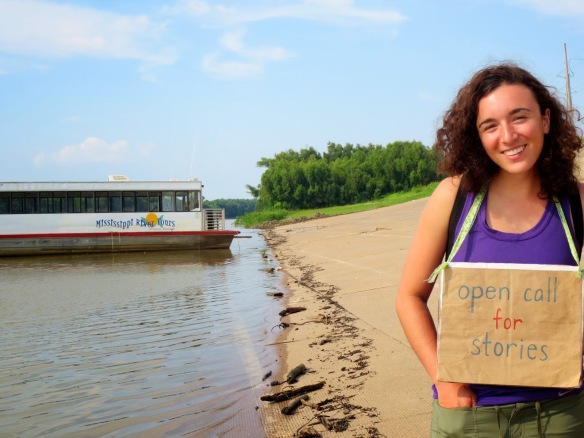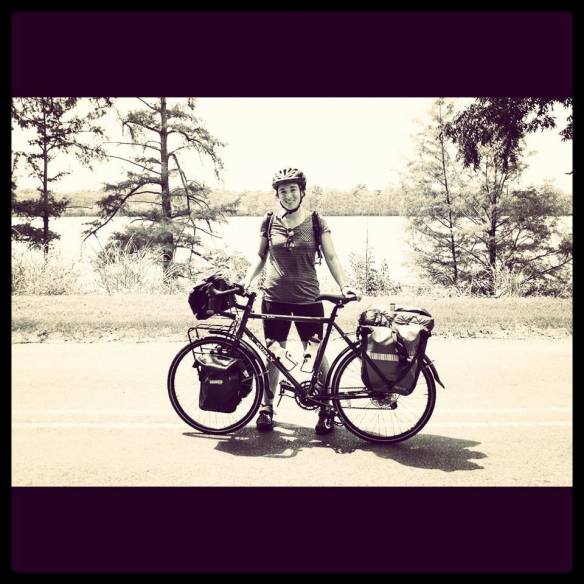We’ve all heard the stereotypes: Millennials are lazy and entitled, more concerned with taking selfies than self-sacrifice. We don’t think that’s true. This interview series, “Millennials Who Do Cool Sh*t”, is our way of showing that many of us are out there getting involved, helping our communities and generally doing cool sh*t.
Devi is a poet, folklorist, storyteller, rower, and lover of bike trips. Her poems have been published by Split This Rock, Sinister Wisdom, Verse Wisconsin, and Cicada. She wrote a book-length work of poems for her senior thesis inspired by stories she collected on an 800-mile bike trip that she took in 2013 along the Mississippi River Trail. Having graduated from Harvard this spring, she is about to leave on a year-long trip with support from a Gardner and Shaw Postgraduate Traveling Fellowship. During this year she will spend a few months in Fiji and Tuvalu, bike the length of New Zealand, and then bike during the late spring and early summer in the UK, all while collecting stories from the people she meets.
Tom: The focus of your upcoming trip is collecting stories on water-based climate change. What do you think the role of stories will be in pushing for meaningful measures to address climate change?
Devi: I’m not a policy person, but I do know a bit about storytelling.
Here’s the thing: change can start with a single story. Just one person.
Listening to another human being with the whole of our hearts, I think, is one of the most radical things we can do as humans. I see listening as an act of love. This project is a love letter from me to the world. It is a meditation on the meaning of home through the eyes of the people who I encounter. I mean, we’re on the brink of change. Huge change. Terrifying change. I’m on a mission to document one tiny slice of it, to love and share the stories for what they are.
One of the stops on my trip is Tuvalu, a small island in the Pacific. The nation’s highest point is currently only 14.7 feet above sea level. With a steady rise of sea levels, salt water has inundated the previously fresh groundwater supply. Erosion, intense storm surges, and increasingly unpredictable weather patterns threaten Tuvaluan identity and culture. In the event that Tuvalu disappears underwater, New Zealand has agreed to accept its 11,600 citizens. A number of Tuvaluans have already moved to New Zealand; not just immigrants, they are “climate refugees.”
In the face of such dramatic changes, what parts of life are currently disappearing before our eyes? What new practices have emerged? How do communities frame or re-frame the notion of “home” when—in the case of Tuvalu—home is predicted to disappear within a lifetime? What of water and its movement carries us from this generation into the beyond?
As a poet and folklorist, I will listen, document, and engage. The time to hear these stories is now.
Devi: I don’t know if I seek out water or water seeks out me. It’s primordial, really. My mom worked as the aquatics director for a pool when she was pregnant with me. I grew up learning how to swim in her arms. At the suggestion of one of my mom’s students, I switched from dancing and playing ice hockey to rowing crew and fell in love with water. There is little I love more than spending a few hours every day on the Squamscott or Charles River. The routine has become a part of me. I’m nervous-excited to see the person that I will become without a varsity sport in my life, but I know that the discipline I learned on the water translates into the ways I approach poetry and art.
One of my college coaches once told me: “Devi, you’d be a better rower if you only thought about rowing while you’re on the water.” And he was right. The thing is, my brain doesn’t work like that. I work out poems and questions and all manners of things while suspended between water and sky. It’s my favorite way to think. Maya Rachel Stein, one of my favorite cycling poets (in fact, the only other cycling poet I know of…someone please introduce me to more!), recently posted on her FB page: “when my body is working, my mind always follows.” I feel the same way. When I have an oar between my hands and am propelling myself through water, my mind is free to go where it needs to go.
Tom: Why did you choose biking as your way to get around?
Devi: If my back were less sensitive, I would take cue from Mildred Norman and walk. I love to move slowly, but my body can’t tolerate carrying that much weight on my back. And so, I bike. On a bike I can haul 50 pounds of stuff (tent, sleeping bag, audio recorder, laptop, kindle, maps, etc.) without much strain. My legs love the challenge.
Biking lets me get places slowly and quickly at the same time. I can stop and talk to folks for hours and still make it 30–70 miles away by the end of the day. A bike gives me the invitation to interact with people I would not otherwise meet. On my cycling trip through the Mississippi River delta last summer, I was humbled by the warmth, hospitality, and encouragement I received. I am eager to continue this practice of serendipitous wandering on two wheels as a means of meaningfully interacting with people and place.
My grandfather taught me how to ride a bicycle in the high school parking lot in Ridgefield, CT when I was seven years old. When he let go for a moment and I found I could balance, it was the first time in my life I remember feeling free. When we got back home and he told the story, I remember feeling confused as to why the adults made such a big deal out of it. My grandmother bought me an ice cream cone.
Given a bike and a road, I can go most anywhere—what a gift! On a bike I can move farther and faster than my legs would take me alone. I’m not dependent on fossil fuels to keep me going. All I need is a clear head and heart and a belly full of peanut butter. Have I mentioned that peanut butter and tortillas are the ultimate touring food? Do people eat peanut butter in New Zealand?
Another part of the story is that a few years ago I tore my ACL playing pick-up soccer with a women’s league in Argentina. During the rehab process, biking was one of the first activities that I was able to do. Rowing and dancing and running came back later. The closeness I felt to cycling in the rehab process hasn’t really left.
This Kostas Kiriakakis poster of a H.G. Wells quotation sums it up pretty well:
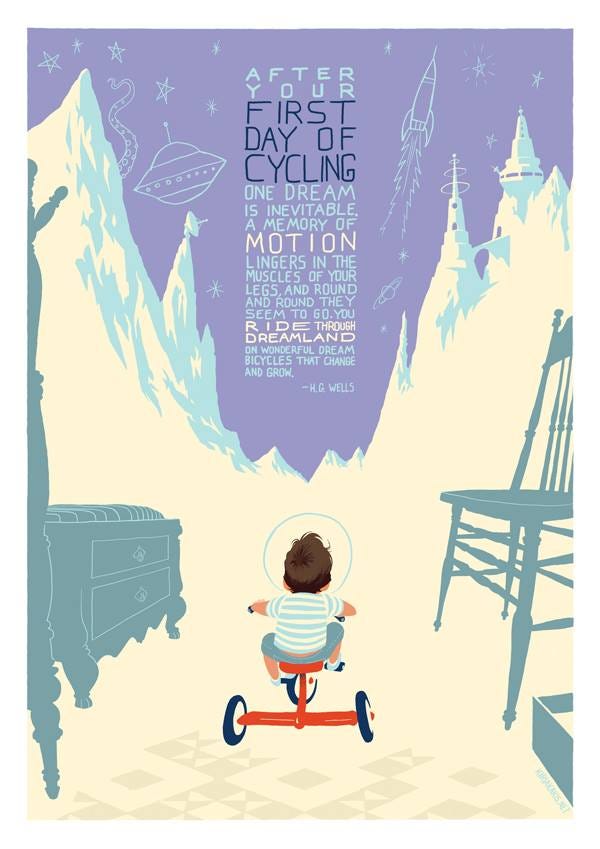
A Kostas Kiriakakis poster
Tom: Of all the stories you’ve been told so far, what’s one of your favorites?
Devi: This story-poem I wrote comes from New Orleans, LA. The inspiration comes from a storyteller I met at a post office in the French Quarter where I was buying stamps.
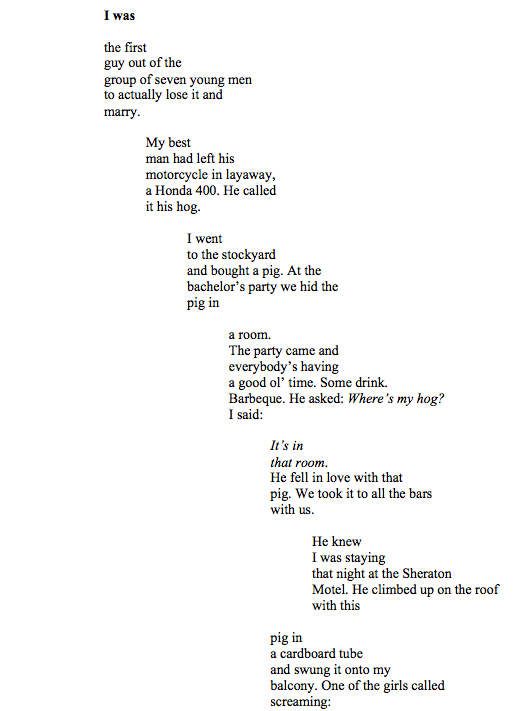
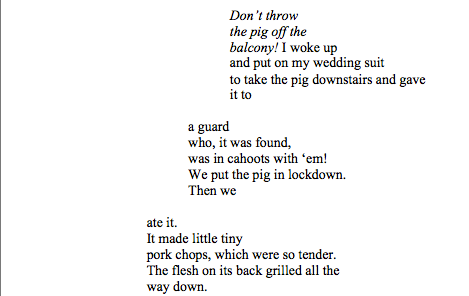
Tom: What are you reading right now?
Devi: I just finished Marilyn Chin’s Hard Love Province and I am in the middle of Anna Deavere Smith’s Letters to a Young Artist. Earlier this summer I read Chimamanda Ngozi Adichie’s Americanah and it made me want to write fiction, which is terrifying.
Last week I bought a kindle to use for this year of travel and I love it. Paper books will always be my first choice (esp. for poetry) but there’s power in carrying 1000 books in a thing that weighs less than 1lb. I feel like Hermione Granger with her expandable bag.
If anyone has suggestions for books I should add to my kindle library for this trip, please tweet @devi_lockwood. The more the merrier!
Speed round
Devi: The 1997 Lilith Fair version of “Water is Wide” by the Indigo Girls, Jewel, and Sarah McLachlan.
Devi: Whitestone Lake in Dunchurch, Ontario. My grandparents live up there and it’s gorgeous. I am currently looking out over this body of water. The lake has a culture where you can drop in at anyone’s cottage at any time of day or night to have a drink and talk about life. Not many places in the world are like that. It is magic.
Place you’ve always wanted to travel
Devi: This fellowship is making my dream trip a reality, so thinking forward to the next adventure…who knows! I would love to do a crazy-long biking tour starting in the northeastern US, going down the eastern seaboard, across the southern US, up through California and Oregon and Washington state and then across the length of Canada. Maybe even throw a side trip to Alaska in there. I also hear that biking in Acadia National Park is beautiful.
Tom Guthrie is Co-Founder and Executive Director of Youth Voices USA, a non-profit advocating for millennials in politics. For more info, follow us on Twitter, like our Facebook page, and check out our website at www.youthvoicesusa.org. Email us at contact@youthvoicesusa.org if you know somebody that we should interview.

